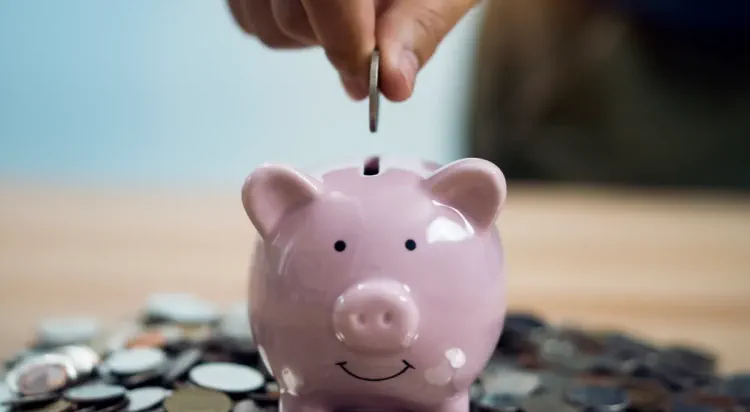
Saving Money Tips
The American Psychological Association finds that money is the top stress factor in American's lives each year. Half have high anxiety about savings regardless of income. So how much should you be saving? Well there are many suggested rules you can find but the reality is that it depends on your situation. In America the bottom 20% of earners save on average 1% of their income, while the top 20% save 25% of their income. Clearly there is more ability to save the more you earn.
The basic rule has to be save some when you can. Apart from your overall income verses spending, there are events like getting married, promotions, lay-offs, bonuses, or buying a house which impact your savings or saving ability. Any bad financial shock is much less disturbing if you have put money away for that rainy day. So let's look at planning to save.
The amount you can save is simply the money you take home less what you spend. Your income is usually quite easy to find. Your expenses take a bit more work. Some things like rent or utility bills are normally quite easy to identify as a monthly amount. Everything else needs to be put under headings like groceries, car costs, holidays, going out and accounted for by averaging these things over a long time period of several months or a year so you can reasonably match income against average costs in say a month. Now you are in a position to budget. Are you in a position to save money or are you overspending (i.e. borrowing or living off savings)? If you are saving, that is great, then automatically transfer that money into a savings account just for rainy day items or investments. This will keep your spending on track and you will easily see if you are doing better or worse than expected.
To save more or borrow less there are two ways to go. You can either increase your income or cut your spending. The first option is normally preferable as the stress associated with changing to a higher income is probably less than depriving yourself of things. Consider going after a promotion, switching jobs, getting a side hustle or growing your business if applicable. On the spending side there are many things to think about. Firstly, look at your purchases in the light of how happy they make you feel and/or how useful they are. For instance, does buying a more expensive car, or getting another dress, make you feel that much happier compared with spending the difference in cost on other things that could make you happy? It is a prioritization game where only you can judge where to put your money. Will buying a course or getting a faster laptop be useful in your progression to earn more? Would saving more or cutting borrowing reduce your stress levels? This is about you squaring your budget in a way that makes you feel most comfortable. Secondly, focus your money saving attention on the big-ticket items. Many people don't spend much more time considering a house or car purchase than they do small items they buy on Amazon. Saving a few percent on a big item, by reviewing the market and then negotiation, will be far more significant than lots of savings on small items. Finally, having said that, there is a list of good money saving tips below.
What if you are currently in a state of borrowing? Getting into borrowing is not necessarily a bad thing. Sometimes it is an emergency stopgap to bridge a situation. It could be for an investment in yourself, like paying for a course, or a business that will grow. A mortgage for a house, if your situation is stable, makes economic sense when you consider the rent saving. The only time borrowing works to fund general lifestyle is when the person is on a career trajectory which will make them rich enough to just pay off the debt eventually. This does not often happen. To avoid stress and a bad situation it is best to recognise this early and make a plan to reduce debt. Have regard to the suggestions above and to goal setting tips in other blogs like, maybe starting slowly and reviewing your progress regularly.
When thinking about saving it is worth mentioning investments. There are two main areas suitable for long term investing which are the stock market and property. If you don't have expertise in this area beware the risks. If you have short or medium term needs for savings then keep them to regular savings accounts. Over the long term the stock market and property reliably perform well. If you average the risks with a diverse portfolio of investments over a long period of time you should expect a better return than with ordinary savings accounts. If you start short term trading of investments and you are not a full time professional you will likely lose money.
Why would you want to save money?
- Low frequency items like holidays, annual bills, tax.
- Unforeseen expenses like car repairs, things breaking, dental treatment.
- To buy a house you will need to save for a deposit.
- Buying a car even with car finance requires a deposit to get a reasonable interest rate.
- To get out of debt and stop paying more on everything you buy because you are paying interest.
- Covering periods of unemployment which can happen to anyone unexpectedly.
- For retirement you need a lot of money saved to live well or to retire early.
- If you have kids, you probably want to support them at times in their lives.
- You will be mentally, emotionally and physically better for knowing there is money behind you.
Tips for saving money (where it makes sense to you):
- Use comparison websites for choosing mortgages, car insurance, credit cards, etc.
- Switch energy suppliers, broadband or phone deals when contracts end to the best market offer for you.
- Use a budgeting app so you really understand where your money is going.
- Search for coupons for online purchases for money off deals. There are browser extensions that can do this.
- Unsubscribe from services you don't use anymore.
- Try and use up all the food you buy and scraps you normally throw.
- Get a filter for your water rather than buying bottled water.
- Swap takeouts for cooking and make your own coffee rather than buying out.
- Look at supermarket own brands. They can be as good as the branded product and cheaper.
- Run your dishwasher and washer machine full for efficiency.
- The cooler washes are usually as good unless there is serious grime.
- Hang laundry to dry.
- Defrost your freezer and keep it full for efficiency.
- Service your boiler and/or air conditioner.
- Don't fill your kettle with more water than you need.
- Don't have your thermostat higher than you really need or leave it high if the house is empty.
- Change old light bulbs for LED lighting.
- Do you really need the insurances that go with small things? If you can afford the hit then on average you are better off without them.
- If you were not working for part of a year you may be due a tax rebate.
- Take advantage of any employer pension contribution matching.
- Are you using your car less now? Then you may be overpaying for car insurance.
- Use sites like eBay and depop to sell off stuff you no longer use or go there to find bargains.

